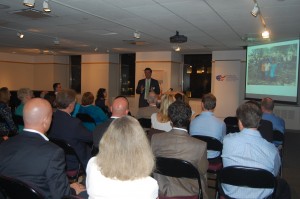It’s Pollution Prevention Week. Chances are, you’ve not really heard about it.
In my last post, I wrote about the Brown Agenda vs. the Green Agenda. Pollution is part of the Brown Agenda. I bet you haven’t heard a lot about that either.

I give talks about pollution throughout the year because real discussion about the pollution is hard to come by. People are constantly surprised at the extent of the problem. So I’ve decided to summarize my key points here to keep conversation going.
So, what is pollution?
Pollution is the introduction of substances that contaminate and poison the environment. Pollution can come from chemical waste dumped into rivers, factories spewing toxins into the air, scavengers burning e-waste to extract valuable components, industrial accidents, and many other sources.
Pollution – life-threatening toxic pollution – is one of the biggest and most pressing global problems. It affects over 100,000,000 people. The health impacts from pollution exceeds issues like HIV.
Yet, pollution is one of the most underreported and underfunded global issues.
Pollution is especially prevalent in developing economies, where rapid industrialization and lack of regulations have resulted in unchecked toxic pollution.
Pollution is a death sentence in poor countries, where poisoned communities cannot afford to clean up toxic pollution, cannot afford to move, and cannot afford to demand change. Even if the cause of pollution, say a factory, is closed down, the contamination often remains. This is called legacy pollution – pollution that continues to poison even through the source is gone.
Pollution is invisible in many countries, where it is so much a part of daily life.
- In Nigeria, no one realized that lead pollution was the cause of hundreds of child deaths. Parents were bringing lead-filled ore back to their homes for processing. The problem was not uncovered until doctors found almost no children in some villages on their immunization visits.
- In Tanzania, a factory was spewing toxic waste into the environment because no one noticed that the treatment plant was not turned on.
- When the wind blows in Gorlovka, Ukraine, poison spreads unnoticed. The lethal substance has been leaking from rotting containers at an abandoned chemical plant located close to a town of 500,000 people. Moreover, with 30 metric tons of explosive TNT stored nearby, the danger of an accident producing a toxic cloud that could kill 50% of the town’s residents in a few minutes is very real.
Pollution is the root cases of many diseases that kill and disable. In some of the world’s worst polluted places, babies are born with birth defects, children have lost 30 to 40 IQ points, and life expectancy may be as low as 45 years because of cancers and other diseases.
Pollution is global. Blacksmith has assessed and identified over 3,000 polluted hotspots across 80 countries, including about 200 sites in Africa and 600 in Asia. While pollution extracts the greatest toll on the people living in contaminated communities, the effects of pollution extend far beyond its source. The global market place loses valuable contributions from poisoned, broken economies. And in many cases, toxic pollution travels and spreads.
Pollution is a global problem that can be solved. We know there is a solution because life-threatening toxic pollution has been eliminated in most developed countries. We have the technology and know-how to remove pollutants, and we have prevented pollution with strict regulations. So while pollution reduces the standard of living and makes people sick in this country, the instances of extreme, life-threatening toxic pollution are rare. So rare that they made a movie – Erin Brockovich – out of the last high profile incident in the U.S.
Pollution is a cheap problem to solve. $20,000 is enough to start a project that saves lives.
So now that you know, help us spread the word about pollution. Talk about pollution. I certainly will.






[…] About « What is Pollution? […]
[…] Read my earlier post: What is Pollution? […]
thanks for creating this website.I am student in the Catholic University of Central Africa in Yaounde Cameroon where i am carrying out a research on fighting against air pollution in Cameroon : The case of Yaounde city. oyur website has been of great help to me in this programme. I would really like to be part of you in the fight against pollution. pleasde you are free to contact me at anytime.
its a good information and a helpful one to create awareness about pollution